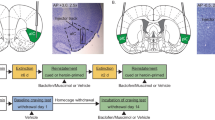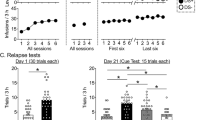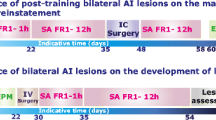Abstract.
Rationale: Second-order schedules of drug-self-administration provide a method of examining drug-seeking behaviour, which is maintained in part by the presentation of a discrete, drug-associated light CS. Previous results have found that lesions of the basolateral amygdala (BLA) impair the acquisition of IV cocaine self-administration under this type of schedule. Objectives: The present experiments examined the effects of excitotoxic lesions of the BLA on the acquisition of IV heroin self-administration under both continuous reinforcement and second-order schedules, in order to investigate possible commonalties in the neural basis of heroin- and cocaine-seeking behaviour. Methods: Rats received quinolinic acid or sham vehicle lesions of the BLA prior to IV self-administration training. Initially, heroin self-administration under a continuous reinforcement schedule was acquired. Each active lever-press resulted in a 0.04 mg IV heroin infusion, paired with presentation of a 20-s light conditioned stimulus. Following acquisition of responding under this schedule, the response requirement was gradually increased to a second-order schedule of FI15(FR5:S). Results: There was no effect of lesions of the BLA on the acquisition of heroin self-administration under a continuous reinforcement schedule. The acquisition of heroin-seeking behaviour under a second-order schedule of self-administration was not affected by lesions of the BLA, but lesioned rats showed a significantly higher baseline level of responding. Conclusions: These results indicate that the rewarding effects of heroin do not depend on the integrity of the BLA. The BLA is also not critically involved in mediating heroin-seeking behaviour under a second-order schedule of reinforcement, and this stands in marked contrast to the effects of BLA lesions on the acquisition of cocaine-seeking behaviour. These findings suggest that discrete heroin cues were not critical in maintaining heroin-seeking behaviour under the second-order schedule used here and that other learning systems are engaged in the control of this behaviour.
Similar content being viewed by others
Author information
Authors and Affiliations
Additional information
Electronic Publication
Rights and permissions
About this article
Cite this article
Alderson, H., Robbins, T. & Everitt, B. The effects of excitotoxic lesions of the basolateral amygdala on the acquisition of heroin-seeking behaviour in rats. Psychopharmacology 153, 111–119 (2000). https://doi.org/10.1007/s002130000527
Received:
Accepted:
Issue Date:
DOI: https://doi.org/10.1007/s002130000527




